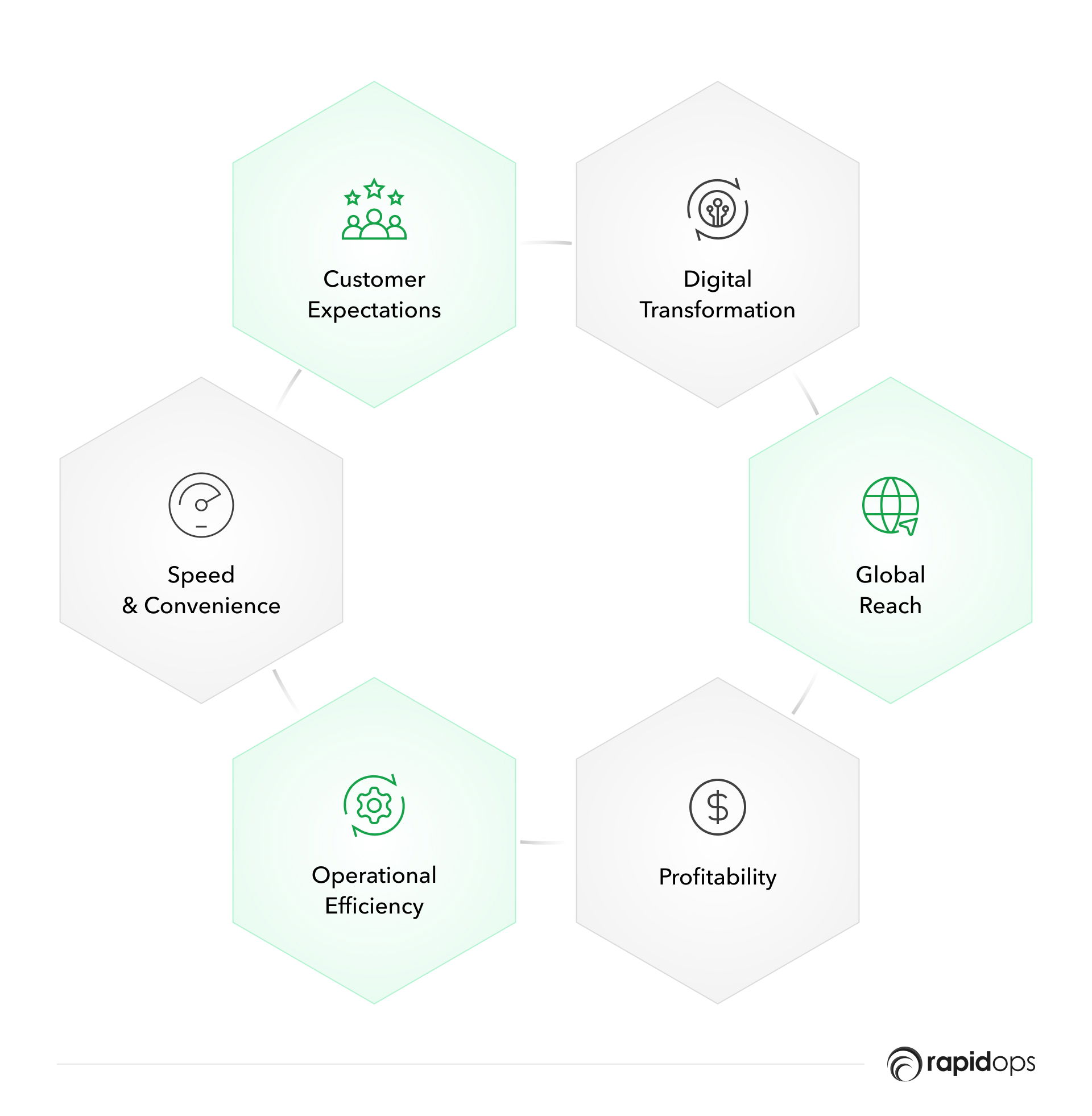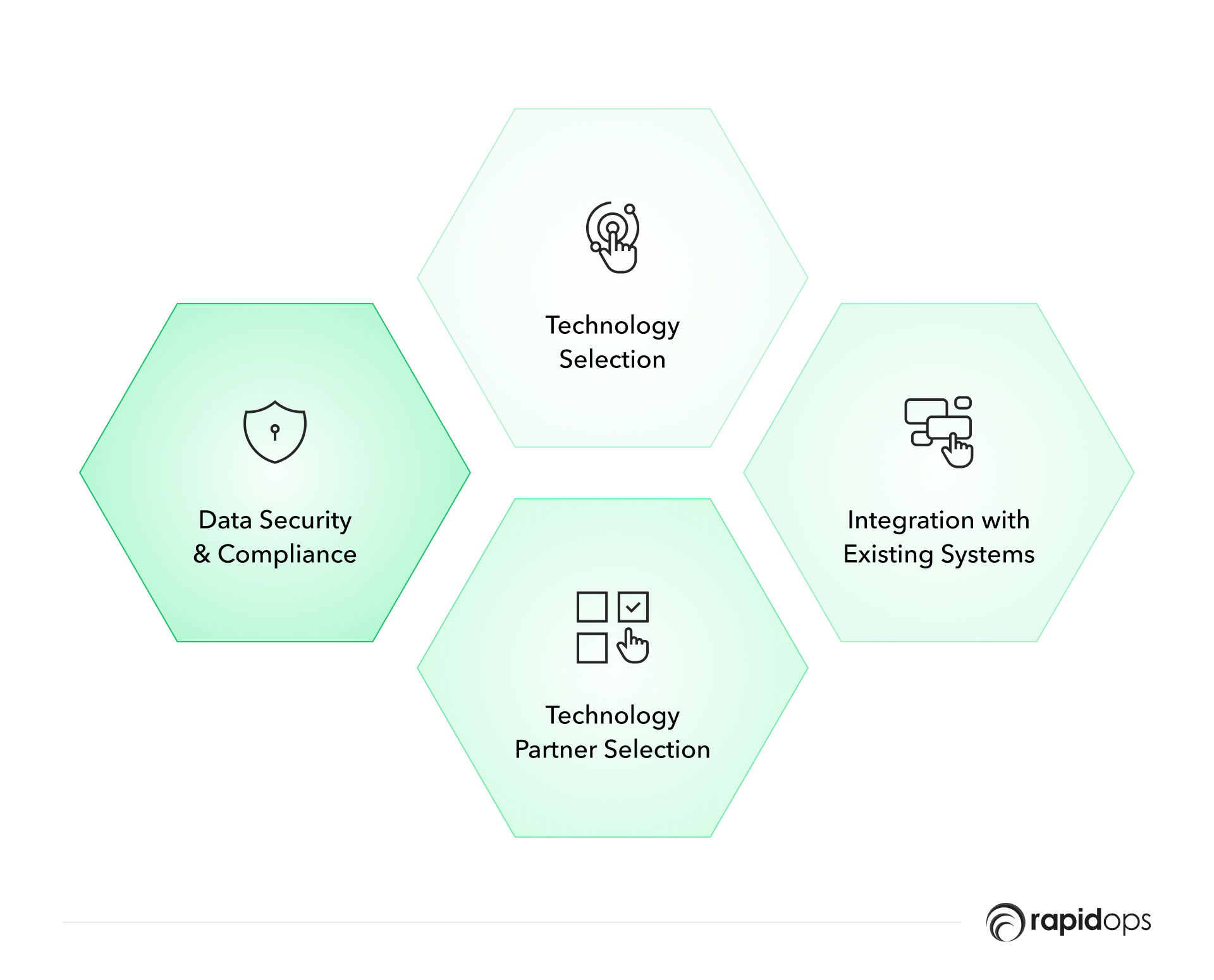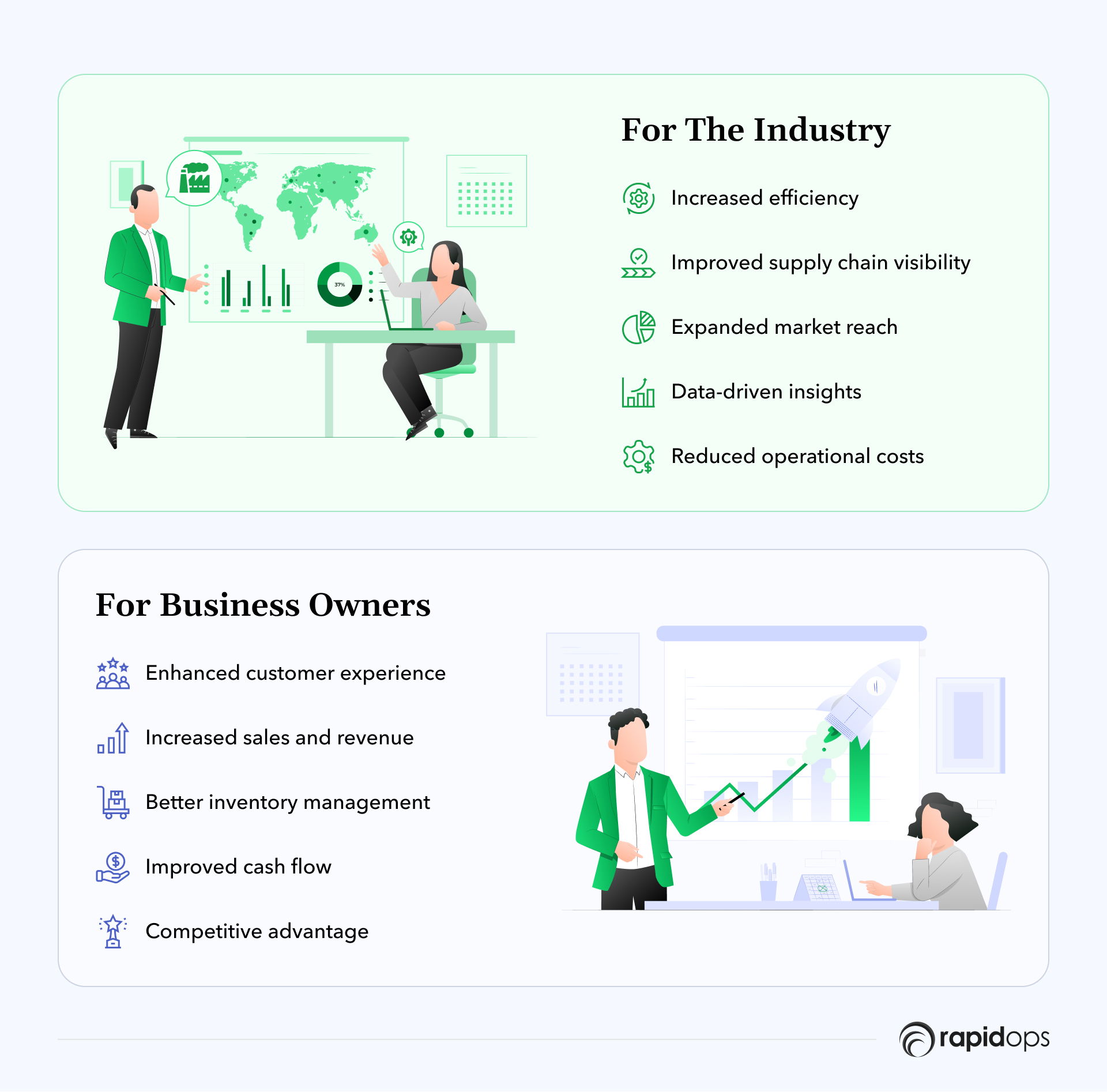- Building Materials
- 12 min read
- August 2024
B2B eCommerce Is Booming in the Building Material Industry
Key Takeaways
Statista data suggests that the North American B2B eCommerce market will surpass $4,600 billion by 2025.
The projected growth of B2B eCommerce sales in the building materials industry is projected to reach $376.72 billion by 2026, indicating substantial growth from previous years.
This trend is not just a passing phase but a transformation driven by evolving market demands and technological advancements.
The building materials industry, traditionally grounded in face-to-face transactions and manual processes, is experiencing a seismic shift toward digitalization.
In recent years, B2B eCommerce has emerged as a pivotal force driving this transformation. With a staggering 35% increase in online transactions in 2023 alone, it's clear that digital platforms are becoming the new norm for businesses in this sector.
Several key factors are fueling the shift towards B2B eCommerce. Evolving customer demands are pushing businesses to provide better services and faster responses.
One key driver of this transformation is the implementation of automated inventory management systems. These systems allow businesses to maintain optimal inventory levels, reduce manual labor, and ensure real-time inventory tracking.
By integrating enterprise resource planning (ERP) systems with ecommerce solutions, companies can achieve better inventory management and streamline operations.
At the same time, companies must focus on retaining existing customers and minimizing attrition to remain competitive. The digitalization of sales channels is no longer optional; it's essential for survival and growth.
Some forward-thinking companies have already reaped the rewards of this transformation, experiencing significant growth and improved customer satisfaction.
This article will delve into the reasons behind the booming B2B eCommerce in the building materials industry, exploring the benefits, challenges, and success stories of digital transformation.
Key drivers of B2B eCommerce growth
An impressive 80% of survey respondents indicated that they expect building materials suppliers to offer online ordering options, showcasing a strong demand for eCommerce in this market.
For decades, the building materials industry has traditionally depended on manual processes, from taking orders to managing inventory. Paper-based systems, coupled with inefficient communication channels, have created bottlenecks and hindered growth.
Managing customer relationships involves tasks that can be time-consuming and limit opportunities for personalization.
By automating routine processes like order taking and inventory management, businesses can free up time for sales representatives to focus on building and nurturing valuable customer relationships.
The inefficiencies of traditional methods have become increasingly apparent, prompting the industry to take decisive action.
With rising costs, heightened competition, and evolving customer expectations, businesses are now actively streamlining operations, reducing errors, and improving overall efficiency. By embracing automation and modern solutions, companies are addressing these challenges head-on and driving significant improvements.

The building materials industry is experiencing a perfect storm of factors propelling the adoption of B2B eCommerce. Let's delve into the key drivers:
1. Customer expectations
The shift in customer behavior towards online shopping is wider than in B2C markets. B2B buyers are increasingly expecting the same level of convenience and efficiency they experience in their online shopping.
Features like detailed product information, customer reviews, and easy reordering options are now essential in the B2B space.
- Embracing a digital-first mindset: Today's buyers, whether contractors, builders, or architects, are expecting a seamless digital experience. They want easy access to product information, real-time inventory updates, and efficient ordering processes.
- Providing personalized service: Customers are craving tailored solutions. B2B eCommerce platforms offer personalized product recommendations, pricing, and promotions, enhancing customer satisfaction.
2. Digital transformation
Digital transformation is driving the rapid adoption of B2B eCommerce in the building materials industry. As companies pursue comprehensive digitalization, integrating all sales channels has become a crucial part of this journey.
By adopting advanced eCommerce platforms, businesses can seamlessly sync with other systems, such as Customer Relationship Management (CRM) and Enterprise Resource Planning (ERP), enabling efficient service, personalized recommendations, and targeted marketing.
This holistic approach enhances customer experiences and supports the industry's evolving needs for streamlined operations and innovative technology utilization.
- Gaining efficiency: Automating tasks like order processing, inventory management, and invoicing frees up valuable resources and reduces errors.
- Making data-driven decisions: B2B eCommerce platforms are generating valuable data insights into customer behavior, sales trends, and product performance, enabling data-driven decision-making.
3. Global reach
By eliminating geographic barriers, B2B eCommerce opens up new markets and opportunities for growth. Businesses can leverage digital marketing strategies to reach potential customers worldwide, increasing their market share and revenue.
- Expanding the market: B2B eCommerce is breaking down geographical barriers, allowing businesses to reach a wider customer base and tap into new markets.
- Facing increased competition: To compete globally, companies must offer efficient and convenient online shopping experiences.
4. Profitability
The cost savings from reduced physical infrastructure and manual labor are significant. Additionally, digital platforms provide valuable data analytics that help businesses optimize pricing strategies, inventory levels, and marketing efforts, further boosting profitability.
- Reducing costs: Streamlined operations, reduced paperwork, and optimized inventory management are leading to significant cost savings.
- Growing revenue: B2B eCommerce is opening up new revenue streams through cross-selling, upselling, and increased sales efficiency.
5. Operational efficiency
Automation of routine tasks such as order processing, invoicing, and inventory management reduces the burden on staff, allowing them to focus on more strategic activities. This efficiency leads to faster turnaround times and improved accuracy.
- Improving supply chain visibility: Real-time inventory tracking and order management are enhancing supply chain efficiency and reducing stockouts.
- Fulfilling orders faster: Automated processes and streamlined workflows are leading to faster order processing and delivery.
6. Speed and convenience
Customers appreciate the ability to place orders and access services at their convenience. Quick order processing and reliable delivery enhance the customer experience, fostering loyalty and repeat business.
- Providing 24/7 access: Online platforms are giving customers round-the-clock access to products and information.
- Offering self-service options: Customers can easily place orders, track shipments, and access invoices without human intervention.
By understanding these key drivers, building materials businesses can recognize the immense potential of B2B eCommerce in transforming their operations and gaining a competitive edge.
Challenges in B2B eCommerce

While the potential benefits of B2B eCommerce are substantial, building materials businesses face several challenges in their digital transformation journey:
1. Technology selection
Choosing the right eCommerce platform and technology stack is critical. Businesses must ensure that the platform they select can handle the complexity of B2B transactions, integrate with existing systems, and scale as the business grows.
The vast array of options available can make choosing the right eCommerce platform, ERP system, or other software overwhelming.
Example: ABC Construction Materials struggled with its initial eCommerce platform, which needed more features such as bulk ordering and complex pricing structures. After switching to a more robust platform designed for B2B transactions, they saw a significant improvement in efficiency and customer satisfaction.
2. Integration with existing systems
A siloed approach to technology can lead to inefficiencies and data discrepancies.
Integrated systems ensure that all business processes are connected, providing a unified view of operations and improving decision-making. This often involves using APIs or middleware to connect disparate systems.
Example: XYZ Building Supplies needed help integrating its new eCommerce platform with its legacy ERP system. To bridge the gap, it invested in middleware solutions and professional services, which resulted in smoother operations and better data management.
3. Technology partner selection
A reliable technology partner can provide more than just a platform; they offer strategic advice, customization options, and ongoing support.
It's essential to vet potential partners thoroughly, considering their experience in the industry and their ability to scale with your business.
Example: ABC Materials initially partnered with a provider that failed to deliver the necessary support, leading to numerous technical issues. After switching to a more experienced partner with a proven track record in B2B eCommerce, their platform performance and support improved drastically.
4. Data security and compliance
Protecting customer data involves implementing multiple layers of security, such as firewalls, encryption, and secure user authentication. Regularly updating security protocols and staying informed about regulatory changes are also crucial for maintaining compliance.
B2B transactions often involve sensitive information, and any breaches can result in significant financial and reputational damage.
Example: A building materials supplies business implemented robust security measures, including encryption, secure payment gateways, and regular security audits, to protect customer data and comply with industry standards like GDPR. This proactive approach helped build trust with their customers and avoid potential security issues.
Benefits of B2B eCommerce in the building materials industry

The transition to B2B eCommerce brings numerous advantages to the building materials industry, significantly enhancing efficiency, profitability, and customer satisfaction.
1. For the industry
- Increased efficiency: B2B eCommerce platforms streamline order processing, reducing the time and effort required to manage orders manually. Automation minimizes errors and accelerates workflows.
- Improved supply chain visibility: Enhanced tracking of materials and inventory management leads to better supply chain coordination, reducing the risk of stockouts and overstock situations.
- Expanded market reach: By adopting eCommerce, businesses can reach customers beyond their local markets, tapping into national and international audiences.
- Data-driven insights: eCommerce platforms provide valuable data on customer behavior, market trends, and product performance. These insights help businesses make informed decisions and optimize their operations.
- Reduced operational costs: Digitalization reduces overhead expenses associated with physical stores and manual processes. Automation and self-service options also significantly lower operational costs.
2. For business owners
- Enhanced customer experience: eCommerce platforms offer improved order accuracy, faster delivery times, and personalized service, leading to higher customer satisfaction and loyalty.
- Increased sales and revenue: Digital platforms provide opportunities for cross-selling and upselling, increasing the average order value and overall sales.
- Better inventory management: Automated inventory management systems help prevent stockouts and overstocks, optimize inventory levels, and reduce carrying costs.
- Improved cash flow: Faster order processing and automated invoicing improve cash flow by reducing the time between order placement and payment collection.
- Competitive advantage: Offering advanced digital services sets businesses apart from competitors still relying on traditional methods, attracting more customers and retaining existing ones.
The rise of B2B eCommerce in the building materials industry is revolutionizing the way businesses operate.
By adopting eCommerce solutions and integrating them with existing ERP systems, companies can achieve significant improvements in inventory management, customer satisfaction, and overall operational efficiency.
This digital transformation is not just a trend but a strategic move towards a more efficient and customer-centric business model.
Concluding thoughts
As the building materials industry embraces the digital era, the shift to B2B eCommerce is not just an opportunity but a strategic necessity. The businesses that adapt and innovate today will be the leaders of tomorrow.
Rapidops stands ready to be your technology partner on this transformative journey. With over 15 years of experience working with building materials businesses, we've empowered industry giants with robust B2B eCommerce platforms tailored to their unique needs.
We understand what it takes to streamline operations, enhance customer experiences, and integrate new technologies seamlessly with existing systems.
Choosing Rapidops means partnering with a team committed to your growth and scalability. Let us help you build a future-ready B2B eCommerce platform that meets your customers' expectations and positions your business for long-term success.
Frequently Asked Questions
How can B2B e-commerce help improve customer satisfaction in the building materials industry?
How can I measure the ROI of my B2B e-commerce investment?
What are the emerging trends in B2B e-commerce for the building materials industry?
How can I integrate my existing ERP system with a B2B e-commerce platform?
What are the essential features of a B2B e-commerce platform for the building materials industry?




